
Our Team in India

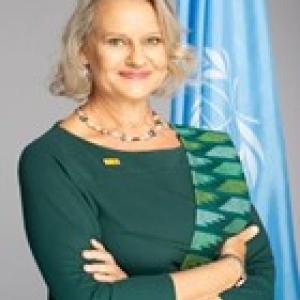
Andrea M Wojnar
UNFPA
Resident Representative, India and Country Director, Bhutan
Ms. Wojnar, a US national, brings with her over 36 years’ of experience in leading and administering development and humanitarian operations from grassroots to international levels. Prior to her appointment to UNFPA India, she served as the UNFPA Mozambique Representative and UNFPA Senegal Representative and Country Director for The Gambia. Before that, Ms. Wojnar occupied various leadership positions for the US Peace Corps, International Federation of Red Cross and Red Crescent Societies (IFRC), and the American Red Cross Society across 50 countries in Africa, Asia, and Latin America.
Ms. Wojnar holds Masters degrees in: Management from McGill University (Montreal, with studies at INSEAD France, Lancaster University UK, Indian Institute of Management Bangalore, LG Institute Seoul, and JAIST Kanazawa), and in Global Social Change & Development/Economics from the Johns Hopkins School for Advanced International Studies (Washington D.C.), and a Bachelor's degree with Honours from Wesleyan University, (Connecticut, USA).
She is passionate about using data and evidence to influence policy decisions that promote gender equality, empower women and girls, and ensure rights and choices for all.
Ms. Wojnar holds Masters degrees in: Management from McGill University (Montreal, with studies at INSEAD France, Lancaster University UK, Indian Institute of Management Bangalore, LG Institute Seoul, and JAIST Kanazawa), and in Global Social Change & Development/Economics from the Johns Hopkins School for Advanced International Studies (Washington D.C.), and a Bachelor's degree with Honours from Wesleyan University, (Connecticut, USA).
She is passionate about using data and evidence to influence policy decisions that promote gender equality, empower women and girls, and ensure rights and choices for all.
Read more
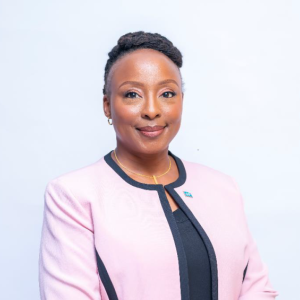
Angela has over 25 years of experience in socio-economic analysis, inclusive and sustainable national development policies, leading projects and programmes, resource mobilization and UN Coordination. She is passionate about youth empowerment, gender equality and leadership development.
Prior to this appointment, Angela was the UNDP Resident Representative for Ghana from 2020-2024 and Strategic Advisor in the UNDP Regional Bureau for Africa in New York since 2012. She also served as Regional Program Advisor to the UNEP/UNDP Poverty and Environment Initiative (2007-2012), Poverty Program Specialist for UNDP Tanzania (2005-2007), Assistant Resident Representative for Strategy and Policy for UNDP Nigeria (2003-2005), Economist and Policy Analyst for the International Fund for Agricultural Development (2000– 2003) and Young Professional at the Food and Agriculture Organisation (2000). Prior to joining the UN, she provided policy and analytical support to the Governments of Botswana and South Africa on behalf of the University of Reading (UK) and the Department for International Development (DFID).
Angela holds a PhD in Agricultural Economics from the University of Reading in the UK, a Masters degree in Agricultural Economics from the University of Reading and a Bachelors degree in Economics and Computer Science from the University of Waterloo in Canada.
Prior to this appointment, Angela was the UNDP Resident Representative for Ghana from 2020-2024 and Strategic Advisor in the UNDP Regional Bureau for Africa in New York since 2012. She also served as Regional Program Advisor to the UNEP/UNDP Poverty and Environment Initiative (2007-2012), Poverty Program Specialist for UNDP Tanzania (2005-2007), Assistant Resident Representative for Strategy and Policy for UNDP Nigeria (2003-2005), Economist and Policy Analyst for the International Fund for Agricultural Development (2000– 2003) and Young Professional at the Food and Agriculture Organisation (2000). Prior to joining the UN, she provided policy and analytical support to the Governments of Botswana and South Africa on behalf of the University of Reading (UK) and the Department for International Development (DFID).
Angela holds a PhD in Agricultural Economics from the University of Reading in the UK, a Masters degree in Agricultural Economics from the University of Reading and a Bachelors degree in Economics and Computer Science from the University of Waterloo in Canada.
Read more
Areti Sianni (Greece) has worked for thirty years on refugee protection at country, regional and headquarters levels in Europe, Middle East and North Africa and Asia-Pacific regions including in emergency operations. Prior to taking her assignment in India, she served as Assistant Representative (Protection) with UNHCR Yemen and as Assistant Chief of Mission (Protection) with UNHCR Libya.
Areti has also served as Senior Protection Adviser with UNHCR’s Regional Bureau for the Middle East and North Africa and in a policy advisory capacity on responses to mixed population flows in various countries. From 2012-2014, she was seconded to the Bali Process Regional Support Office where she advised on protection sensitive responses to mixed movements of refugees and migrants including by sea. Before joining UNHCR in 2008, Areti worked as an independent consultant as well as with foundations and international NGOS including the European Council on Refugees and Exiles, Amnesty International- International Secretariat and the Barrow Cadbury Trust.
Areti Sianni holds degrees in Development Studies (MSc, London School of Economics, London, UK), Politics (MA, Macquarie University, Sydney, Australia) and Political Science and Public Administration (University of Athens, Greece). She speaks Greek, English, French and Spanish.
Areti has also served as Senior Protection Adviser with UNHCR’s Regional Bureau for the Middle East and North Africa and in a policy advisory capacity on responses to mixed population flows in various countries. From 2012-2014, she was seconded to the Bali Process Regional Support Office where she advised on protection sensitive responses to mixed movements of refugees and migrants including by sea. Before joining UNHCR in 2008, Areti worked as an independent consultant as well as with foundations and international NGOS including the European Council on Refugees and Exiles, Amnesty International- International Secretariat and the Barrow Cadbury Trust.
Areti Sianni holds degrees in Development Studies (MSc, London School of Economics, London, UK), Politics (MA, Macquarie University, Sydney, Australia) and Political Science and Public Administration (University of Athens, Greece). She speaks Greek, English, French and Spanish.
Read more
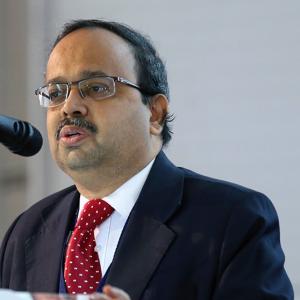
Balakrishna Pisupati
UNEP
Country Head
Dr. Balakrishna Pisupati is an internationally renowned conservation and development specialist with close to three decades of experience working at national, regional and international levels, holding positions such as the Head of Environment Policy at UNEP, Vice-Chancellor, Trans Disciplinary University (TDU, India), Chief of Biodiversity, Land Law and Governance programmes at United Nations Environment Programme (UNEP, Kenya), Senior Policy Fellow at Fridtjof Nansen Institute (FNI, Norway), Chairman, National Biodiversity Authority-Government of India (NBA, India), Coordinator, Biodiplomacy Programme at United Nations University (UNU-IAS, Japan), Head, Regional Biodiversity Programme for Asia at the World Conservation Union (IUCN, Sri Lanka), Head, Biodiversity and Biotechnology programme at the M S Swaminathan Research Foundation (MSSRF, India).
He currently is the Country Director of UNEP in India, focusing on issues of science policy interfaces, policy coherence, environmental governance and the related.
He is an invited Fellow of American Association of Advancement of Science, elected Fellow of Linnean Society London, invited member of Cambridge Commonwealth Society, Policy Fellow at Fridtjof Nansen Institute, Adjunct Fellow at Research Information Systems (RIS) – a think tank of Ministry of External Affairs, Government of India.
With a passion for writing, he has published more than 200 research articles and reports on various issues of environment and development and has a keen interest in transdisciplinary studies.
He currently is the Country Director of UNEP in India, focusing on issues of science policy interfaces, policy coherence, environmental governance and the related.
He is an invited Fellow of American Association of Advancement of Science, elected Fellow of Linnean Society London, invited member of Cambridge Commonwealth Society, Policy Fellow at Fridtjof Nansen Institute, Adjunct Fellow at Research Information Systems (RIS) – a think tank of Ministry of External Affairs, Government of India.
With a passion for writing, he has published more than 200 research articles and reports on various issues of environment and development and has a keen interest in transdisciplinary studies.
Read more
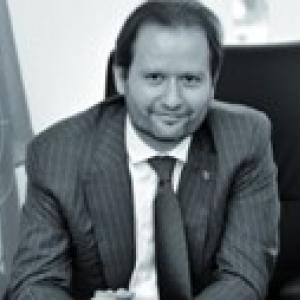
Cristiano Massimo Pasini
UNIDO
Director and Representative UNIDO Sub-Regional Office in India covering Afghanistan, Bangladesh, Bhutan, Maldives, Nepal, Sri-Lanka
Cristiano Massimo Pasini joined as Director and Representative UNIDO Sub-Regional Office in India covering Afghanistan, Bangladesh, Bhutan, Maldives, Nepal, Sri-Lanka in October 2024. He brings over 20 years of high-level professional experience to his role at UNIDO. His diverse career includes various senior managerial positions related to sustainable industrial development, poverty reduction and post-conflict recovery at national, regional and global level.
Before his assignment for India, he served as the Director of the Division for Industrial Policy Advice and Statistics in Vienna, where he led the team responsible for UNIDO’s flagship publication “The Industrial Development Report”. Mr. Pasini also held the position of Director of the Regional Office of UNIDO for Mexico and Central America and UNIDO Representative for Colombia, Peru, Guyana and Suriname and UNIDO Representative for Lebanon and Syria (2013-2019), leading strategic and programmatic engagements for the organization in those regions and countries. Between 2011 and 2013, Mr. Pasini served as the UNIDO Country Coordinator for Iraq, overseeing a special program to support the country’s industrial rehabilitation.
Mr. Pasini holds a Doctorate Degree in Mechanical Engineering from Sapienza University in Rome, as well as a Master of Business Administration (MBA) from the SDA Bocconi School of Management. He is married and has two children.
Before his assignment for India, he served as the Director of the Division for Industrial Policy Advice and Statistics in Vienna, where he led the team responsible for UNIDO’s flagship publication “The Industrial Development Report”. Mr. Pasini also held the position of Director of the Regional Office of UNIDO for Mexico and Central America and UNIDO Representative for Colombia, Peru, Guyana and Suriname and UNIDO Representative for Lebanon and Syria (2013-2019), leading strategic and programmatic engagements for the organization in those regions and countries. Between 2011 and 2013, Mr. Pasini served as the UNIDO Country Coordinator for Iraq, overseeing a special program to support the country’s industrial rehabilitation.
Mr. Pasini holds a Doctorate Degree in Mechanical Engineering from Sapienza University in Rome, as well as a Master of Business Administration (MBA) from the SDA Bocconi School of Management. He is married and has two children.
Read more
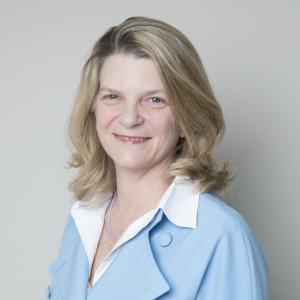
Ms. Cynthia McCaffrey assumed the role of UNICEF Representative to India in October 2022. She brings with her decades of leadership experience and expertise in championing the cause of children and women. She served in UNICEF Headquarters as Director, Office of Innovation, and Director and Chief of Staff of the Office of the Executive Director. Prior to India, Ms. McCaffrey was the UNICEF Representative to China.
As UNICEF Representative to India, Ms. McCaffery provides leadership and strategic direction of the UNICEF India Country Programme in achieving results for children. “India has made substantive progress for children, young people, and women over the past decades,” said McCaffrey, “I look forward to building on UNICEF’s strong partnership with the Government of India and working together across India to advance the rights of every child.”
Ms. McCaffrey joined UNICEF in 2001 as a Senior Programme Advisor leading the relationship between the children’s agency and the governments of the United States, Canada, and Ireland. Later she served as Senior Vice President at the U.S. Fund for UNICEF mobilizing support for UNICEF’s work around the world.
Ms. McCaffrey’s career in international development began with the International Rescue Committee in 1988. She served in the office of the U.S. Executive Director at the World Bank where she coordinated issues regarding Africa, debt relief, health, education and post-conflict. Prior to that Ms. McCaffrey served in a number of posts at the United States Agency for International Development including in the Office of the Administrator, the Center for Democracy and Governance and the Bureau for Legislative and Public Affairs.
Ms. McCaffrey was appointed a White House Fellow in 1995. She holds a Bachelor of Arts from Vanderbilt University and a master’s in public policy from the University of Texas, LBJ School.
A national of the United States of America, Ms. McCaffrey spends her free time with her husband exploring new places, facetiming with her daughters at all hours and joining her sister to zoom into their brother’s comedy shows.
As UNICEF Representative to India, Ms. McCaffery provides leadership and strategic direction of the UNICEF India Country Programme in achieving results for children. “India has made substantive progress for children, young people, and women over the past decades,” said McCaffrey, “I look forward to building on UNICEF’s strong partnership with the Government of India and working together across India to advance the rights of every child.”
Ms. McCaffrey joined UNICEF in 2001 as a Senior Programme Advisor leading the relationship between the children’s agency and the governments of the United States, Canada, and Ireland. Later she served as Senior Vice President at the U.S. Fund for UNICEF mobilizing support for UNICEF’s work around the world.
Ms. McCaffrey’s career in international development began with the International Rescue Committee in 1988. She served in the office of the U.S. Executive Director at the World Bank where she coordinated issues regarding Africa, debt relief, health, education and post-conflict. Prior to that Ms. McCaffrey served in a number of posts at the United States Agency for International Development including in the Office of the Administrator, the Center for Democracy and Governance and the Bureau for Legislative and Public Affairs.
Ms. McCaffrey was appointed a White House Fellow in 1995. She holds a Bachelor of Arts from Vanderbilt University and a master’s in public policy from the University of Texas, LBJ School.
A national of the United States of America, Ms. McCaffrey spends her free time with her husband exploring new places, facetiming with her daughters at all hours and joining her sister to zoom into their brother’s comedy shows.
Read more
Darrin Farrant
UNIC
Director, United Nations Information Centre for India & Bhutan
Mr. Farrant has 32 years of experience in communications, including 20 years with the United Nations. From 2012 to 2022, he was Special Assistant to the Under-Secretary-General for Global Communications. Later he served temporarily as the Acting Chief of Office in the Office of the Under-Secretary-General, DGC.
Mr. Farrant’s other UN assignments include being a speechwriter in the Executive Office of the Secretary-General, an editor with the UN News Centre and the head of communications for the Secretary-General’s panel on the referenda that led to the independence of South Sudan.
In addition, he has extensive experience in crisis communications, campaign development and strategic planning and coordination.
Prior to joining the UN, Mr. Farrant was a journalist, reporter and editor for news outlets in Australia and the United Kingdom, including The Age of Melbourne and The Times of London.
Mr. Farrant holds bachelor’s degrees in law and arts from the University of Melbourne.
Mr. Farrant’s other UN assignments include being a speechwriter in the Executive Office of the Secretary-General, an editor with the UN News Centre and the head of communications for the Secretary-General’s panel on the referenda that led to the independence of South Sudan.
In addition, he has extensive experience in crisis communications, campaign development and strategic planning and coordination.
Prior to joining the UN, Mr. Farrant was a journalist, reporter and editor for news outlets in Australia and the United Kingdom, including The Age of Melbourne and The Times of London.
Mr. Farrant holds bachelor’s degrees in law and arts from the University of Melbourne.
Read more
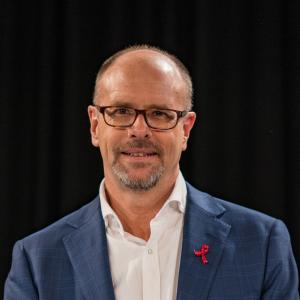
David Bridger is currently the Country Director of the UNAIDS India office, where he leads efforts in promoting an expanded and integrated United Nations system response to HIV in the country, providing the strategic direction, advocacy, coordination and technical support needed to catalyse and connect leadership from governments and communities to deliver life-saving HIV services.
Previously he has served as UNAIDS Country Director in Papua New Guinea, Indonesia and Sri Lanka. Throughout these postings he has supported significant scale-up of services and helped to create an enabling environment and overcome legislative obstacles. In Papua New Guinea, Mr Bridger Chaired the Global Fund Country Coordinating Mechanism at the invitation of the Government and was instrumental in increasing donor support for the HIV response in country.
Regionally, Mr Bridger has worked on several key initiatives including a multi-country World Bank funded information for development programme that oversaw seven countries in Asia receive vital information management technologies. Additionally, he managed the Asia Pacific Leadership Forum which amalgamated regional leadership cooperation in the response to HIV and AIDS as well as working on aspects of the Commission on AIDS in Asia and the Pacific.
Before joining the United Nations in 1998, Mr. Bridger worked with the Albion Street HIV Centre in Sydney, Australia. He was a member of their International Health Team where he worked and advised on their HIV support programme in Thailand. Earlier, Mr Bridger worked in media and publishing in Australia.
Previously he has served as UNAIDS Country Director in Papua New Guinea, Indonesia and Sri Lanka. Throughout these postings he has supported significant scale-up of services and helped to create an enabling environment and overcome legislative obstacles. In Papua New Guinea, Mr Bridger Chaired the Global Fund Country Coordinating Mechanism at the invitation of the Government and was instrumental in increasing donor support for the HIV response in country.
Regionally, Mr Bridger has worked on several key initiatives including a multi-country World Bank funded information for development programme that oversaw seven countries in Asia receive vital information management technologies. Additionally, he managed the Asia Pacific Leadership Forum which amalgamated regional leadership cooperation in the response to HIV and AIDS as well as working on aspects of the Commission on AIDS in Asia and the Pacific.
Before joining the United Nations in 1998, Mr. Bridger worked with the Albion Street HIV Centre in Sydney, Australia. He was a member of their International Health Team where he worked and advised on their HIV support programme in Thailand. Earlier, Mr Bridger worked in media and publishing in Australia.
Read more
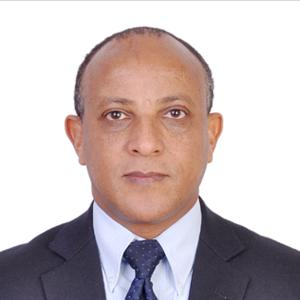
Elias Legesse
UNDSS
UN Security Adviser
Elias Legesse Woldeyes currently serves as the UNDSS Security Adviser in New Delhi, India. With over two decades of experience in security and safety management, he possesses extensive expertise in advising UN Agencies, Funds, and Programmes on mitigating security risks in complex and high-risk environments.
Prior to his appointment in New Delhi, Elias served as the Field Security Coordination Officer (FSCO) for Balochistan, Pakistan, from 2015 to 2018, where he addressed significant challenges in a volatile region. From 2010 to 2015, he was the Regional Security Adviser based in Beijing, China, with responsibilities spanning five countries: Mongolia, Japan, the Democratic People’s Republic of Korea (DPRK), the Republic of Korea (ROK), and China. Earlier, he held key roles in Northeast Afghanistan (2007–2010) and Lahore/Quetta, Pakistan (2004–2007), where he gained extensive field experience in managing security in complex operational settings.
Before joining UNDSS in 2002, Elias worked as a Senior Foreign Service National Investigator at the U.S. Embassy in Ethiopia. In this role, he served as the principal security adviser to the Regional Security Officer, designing and implementing programs to protect U.S. Government personnel and property from terrorism and crime. Prior to this, he held leadership roles as a Battalion Commander in the Ethiopian National Defense and as a Crime Investigator in the Ethiopian Federal Police. His early career also included teaching criminal tactics and law enforcement at the Ethiopian Police College.
Elias holds a Bachelor’s degree in Arts and diplomas in Police Work and Law Enforcement, Criminology, and General Law from reputable institutions in Ethiopia and Germany. Throughout his career, he has effectively utilized his expertise to lead strategic risk management initiatives, implement security mitigation measures, and ensure operational continuity for the UN system.
He is married and has two children.
Prior to his appointment in New Delhi, Elias served as the Field Security Coordination Officer (FSCO) for Balochistan, Pakistan, from 2015 to 2018, where he addressed significant challenges in a volatile region. From 2010 to 2015, he was the Regional Security Adviser based in Beijing, China, with responsibilities spanning five countries: Mongolia, Japan, the Democratic People’s Republic of Korea (DPRK), the Republic of Korea (ROK), and China. Earlier, he held key roles in Northeast Afghanistan (2007–2010) and Lahore/Quetta, Pakistan (2004–2007), where he gained extensive field experience in managing security in complex operational settings.
Before joining UNDSS in 2002, Elias worked as a Senior Foreign Service National Investigator at the U.S. Embassy in Ethiopia. In this role, he served as the principal security adviser to the Regional Security Officer, designing and implementing programs to protect U.S. Government personnel and property from terrorism and crime. Prior to this, he held leadership roles as a Battalion Commander in the Ethiopian National Defense and as a Crime Investigator in the Ethiopian Federal Police. His early career also included teaching criminal tactics and law enforcement at the Ethiopian Police College.
Elias holds a Bachelor’s degree in Arts and diplomas in Police Work and Law Enforcement, Criminology, and General Law from reputable institutions in Ethiopia and Germany. Throughout his career, he has effectively utilized his expertise to lead strategic risk management initiatives, implement security mitigation measures, and ensure operational continuity for the UN system.
He is married and has two children.
Read more
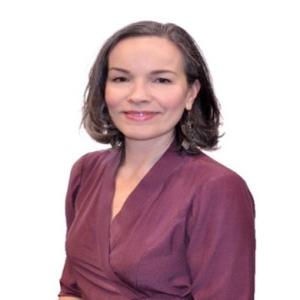
Ms. Elisabeth Faure is a French national with more than 18 years of development and humanitarian experience in Asia, Africa, and Latin America. Prior to this, she served as Director of WFP’s London Office which focuses on advocacy and expanding strategic partnerships including with the British Government, leading media outlets, parliamentarians, private sector, civil society, academia, and the policy community in the UK.
Elisabeth has served as WFP’s Country Representative in Bolivia (2016-2019) leading a team of experts who provide policy advice and technical assistance to strengthen national capacities. The work focused on enhancing nationwide food based social protection systems for vulnerable groups and improving national emergency preparedness measures linked to extreme weather events.
Elisabeth also served as WFP Country Representative in Guinea (2012-2016) managing a team of over 300 staff and coordinating the large-scale humanitarian response to the Ebola epidemic. Leveraging new partnerships, WFP, and sister UN agencies, implemented development and peace building interventions for vulnerable communities during the recovery phase of the Ebola crisis.
Elisabeth’s other roles include a secondment to the Office of the Special Envoy for the Tsunami Recovery, at the United Nations headquarters in New York, where she was part of a small team supporting Former United States President, Bill Clinton.
Elisabeth is a co-founder of the Humanitarian Women’s Network (HWN) established in 2015. HWN is a grassroots online community comprised of more than 13,000 women. HWN seeks to create a safe environment where humanitarian women can flourish free from sexual exploitation, harassment, and abuse.
Ms. Elisabeth Faure has a master’s degree (M.Phil.) in Latin American Studies from Oxford University and a bachelor’s degree in Philosophy from The London School of Economics and Political Science. She is married with 3 children.
Elisabeth has served as WFP’s Country Representative in Bolivia (2016-2019) leading a team of experts who provide policy advice and technical assistance to strengthen national capacities. The work focused on enhancing nationwide food based social protection systems for vulnerable groups and improving national emergency preparedness measures linked to extreme weather events.
Elisabeth also served as WFP Country Representative in Guinea (2012-2016) managing a team of over 300 staff and coordinating the large-scale humanitarian response to the Ebola epidemic. Leveraging new partnerships, WFP, and sister UN agencies, implemented development and peace building interventions for vulnerable communities during the recovery phase of the Ebola crisis.
Elisabeth’s other roles include a secondment to the Office of the Special Envoy for the Tsunami Recovery, at the United Nations headquarters in New York, where she was part of a small team supporting Former United States President, Bill Clinton.
Elisabeth is a co-founder of the Humanitarian Women’s Network (HWN) established in 2015. HWN is a grassroots online community comprised of more than 13,000 women. HWN seeks to create a safe environment where humanitarian women can flourish free from sexual exploitation, harassment, and abuse.
Ms. Elisabeth Faure has a master’s degree (M.Phil.) in Latin American Studies from Oxford University and a bachelor’s degree in Philosophy from The London School of Economics and Political Science. She is married with 3 children.
Read more
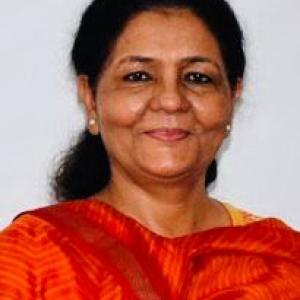
Kanta Singh
UN Women
Country Representative a.i.
Kanta Singh brings over 25 years of experience in managing pro-women development programmes. She has worked with national and international organizations to advance women’s participation in the formal economy, sports, and political leadership.
Prior to joining UN Women, she served with the United Nations Development Programme (UNDP) for nine years. She currently serves as the Country Representative, a.i. at UN Women India Country Office.
A former national-level volleyball player, Kanta is also a Chevening Gurukul Fellow from the University of Oxford.
Prior to joining UN Women, she served with the United Nations Development Programme (UNDP) for nine years. She currently serves as the Country Representative, a.i. at UN Women India Country Office.
A former national-level volleyball player, Kanta is also a Chevening Gurukul Fellow from the University of Oxford.
Read more

Kristian Hölge
UNODC
Regional Representative
Mr. Kristian Hölge, a national of Denmark, has been appointed as the new Regional Representative of the United Nations Office on Drugs and Crime, Regional Office for South Asia (ROSA), which covers Bangladesh, Bhutan, India, Maldives, Nepal and Sri Lanka. Mr. Hölge will assume this new charge as the Regional Representative of ROSA in mid-September 2025.
He joined UNODC in the year 2000 and since then has been working at various international positions of increasing responsibility. Before this post, he served as UNODC’s Representative in Mexico from 2020 to 2025. Prior to that he served as the Representative in Lima, with responsibility for Peru, Ecuador, Argentina, Chile, Paraguay and Uruguay (2016-2020). From 2012 to 2016 he worked in the Regional Section for Latin America and the Caribbean in Vienna.
Having pioneered UNODC’s Legal Assistance Programme for Latin America and the Caribbean from 2000 to 2012, Mr. Hölge combines real technical expertise with hands-on management experience.
Mr. Hölge holds a master’s degree in law from the University of Copenhagen (Denmark) with specialized studies from the Universidad Autónoma de Madrid (Spain). He has taught law at the Universidad de La Sabana (Colombia) and regularly publishes articles on UNODC’s mandate areas, such as drugs, corruption, human trafficking, money-laundering, asset forfeiture, corporate social responsibility and the 2030 Agenda.
He is married to a social entrepreneur with whom he has a daughter.
He joined UNODC in the year 2000 and since then has been working at various international positions of increasing responsibility. Before this post, he served as UNODC’s Representative in Mexico from 2020 to 2025. Prior to that he served as the Representative in Lima, with responsibility for Peru, Ecuador, Argentina, Chile, Paraguay and Uruguay (2016-2020). From 2012 to 2016 he worked in the Regional Section for Latin America and the Caribbean in Vienna.
Having pioneered UNODC’s Legal Assistance Programme for Latin America and the Caribbean from 2000 to 2012, Mr. Hölge combines real technical expertise with hands-on management experience.
Mr. Hölge holds a master’s degree in law from the University of Copenhagen (Denmark) with specialized studies from the Universidad Autónoma de Madrid (Spain). He has taught law at the Universidad de La Sabana (Colombia) and regularly publishes articles on UNODC’s mandate areas, such as drugs, corruption, human trafficking, money-laundering, asset forfeiture, corporate social responsibility and the 2030 Agenda.
He is married to a social entrepreneur with whom he has a daughter.
Read more

Marc de Sousa-Shields
IFAD
Country Director, India and Head of Multi-Country Office
Marc de Sousa-Shields is the India Country Director and Head of Multi-Country Office ( MCO) at the International Fund for Agricultural Development (IFAD).
He previously served as Lead Regional Technical Specialist for Rural Finance and Markets at IFAD, covering the Near East, North Africa, Europe, and Central Asia region. Marc was the lead author of IFAD’s Inclusive Rural Finance Policy, served as Acting Director during the launch of IFAD’s Private Sector Operations Division, and led the development of IFAD’s Private Sector Strategy Action Plan.
Prior to joining IFAD, Marc was Managing Partner and Owner of an international development consultancy with offices across three continents, focused on inclusive sustainable development and investment. He brings decades of experience advising United Nations agencies, national governments, and private sector actors on sustainability and inclusive finance. He has served on several boards and committees, including the US Social Investment Forum.
Marc is the author of Invest Like You Give a Damn (New Society Publishers, 2017), a practical guide for impact-oriented investors. He has contributed to numerous publications, written for leading sustainability journals, and hosted a podcast on market access and sustainable development.
A seasoned globe-trotter, Marc has worked and travelled in over 80 countries, deepening his expertise in rural finance and sustainable investment.
He previously served as Lead Regional Technical Specialist for Rural Finance and Markets at IFAD, covering the Near East, North Africa, Europe, and Central Asia region. Marc was the lead author of IFAD’s Inclusive Rural Finance Policy, served as Acting Director during the launch of IFAD’s Private Sector Operations Division, and led the development of IFAD’s Private Sector Strategy Action Plan.
Prior to joining IFAD, Marc was Managing Partner and Owner of an international development consultancy with offices across three continents, focused on inclusive sustainable development and investment. He brings decades of experience advising United Nations agencies, national governments, and private sector actors on sustainability and inclusive finance. He has served on several boards and committees, including the US Social Investment Forum.
Marc is the author of Invest Like You Give a Damn (New Society Publishers, 2017), a practical guide for impact-oriented investors. He has contributed to numerous publications, written for leading sustainability journals, and hosted a podcast on market access and sustainable development.
A seasoned globe-trotter, Marc has worked and travelled in over 80 countries, deepening his expertise in rural finance and sustainable investment.
Read more
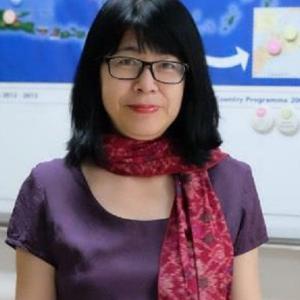
Michiko Miyamoto
ILO
Director of the ILO Decent Work Technical Support Team for South Asia and Country Office for India
Ms Michiko Miyamoto, a Japanese national, is appointed Director of the ILO Decent Work Technical Support Team for South Asia and Country Office for India as of 15 November 2023.
Currently, Ms Miyamoto is serving as the Country Director for ILO activities for Indonesia and Timor-Leste since March 2017. She was based in Jakarta, Indonesia. Promoting ILO’s mandate of Decent Work for All, she has worked in Indonesia and Timor Leste since 2011 under the country framework of focuses on job creation, sound industrial relations and social protection.
She has worked in the field of international development for almost 30 years.Prior to joining the ILO Office in Indonesia, she worked at the ILO Headquarters and the Regional Office for Asia Pacific, specializing in small business development, job creation programme, and capacity development of workforce and institutions. She was also responsible for global agenda setting and consultation meetings for the ILO Governing Body with employers’ associations and trade unions for employment and social policy debate and discussion.
Ms. Miyamoto holds a Master of Public Administration and Master of Art, Public and International Affairs from the University of Pittsburgh.
Currently, Ms Miyamoto is serving as the Country Director for ILO activities for Indonesia and Timor-Leste since March 2017. She was based in Jakarta, Indonesia. Promoting ILO’s mandate of Decent Work for All, she has worked in Indonesia and Timor Leste since 2011 under the country framework of focuses on job creation, sound industrial relations and social protection.
She has worked in the field of international development for almost 30 years.Prior to joining the ILO Office in Indonesia, she worked at the ILO Headquarters and the Regional Office for Asia Pacific, specializing in small business development, job creation programme, and capacity development of workforce and institutions. She was also responsible for global agenda setting and consultation meetings for the ILO Governing Body with employers’ associations and trade unions for employment and social policy debate and discussion.
Ms. Miyamoto holds a Master of Public Administration and Master of Art, Public and International Affairs from the University of Pittsburgh.
Read more
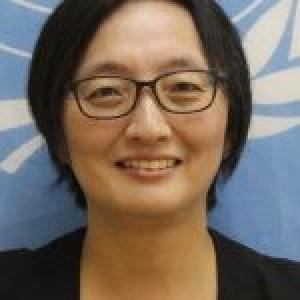
Mikiko Tanaka
UN ESCAP
Director and Head
Ms. Mikiko Tanaka is the Director and Head of ESCAP Subregional Office for South and South-West Asia Office, New Delhi effective 2 May 2022. Ms. Tanaka brings over twenty-five years of experience within the United Nations system. She most recently served as the United Nations Resident Coordinator in Guyana after working as the UNDP Resident Representative. As Resident Coordinator, she led strategic dialogues with the Government and brought coherence to the work of the United Nations Country Team for the implementation of the 2030 Agenda for Sustainable Development. She furthermore supported the conduct of its Voluntary National Review and consolidated socio-economic policy recommendations in response to COVID-19.
Prior to Guyana, Ms. Tanaka served as the UNDP Country Director in Yemen and Timor-Leste, UNDP Deputy Country Director (Programmes) Pakistan, UNDP Deputy Resident Representative in Benin as well as in several other capacities with UNDP at its headquarters as well as in China and Lao People’s Democratic Republic. Before joining the United Nations system, she worked as project coordinator for a non-governmental organization in Thailand as well as in the financial sector in Japan.
Ms. Tanaka holds master’s degrees in public policy and management from the University of London and in rural development management from the Khon Kaen University, and a bachelor’s degree from the International Christian University.
Prior to Guyana, Ms. Tanaka served as the UNDP Country Director in Yemen and Timor-Leste, UNDP Deputy Country Director (Programmes) Pakistan, UNDP Deputy Resident Representative in Benin as well as in several other capacities with UNDP at its headquarters as well as in China and Lao People’s Democratic Republic. Before joining the United Nations system, she worked as project coordinator for a non-governmental organization in Thailand as well as in the financial sector in Japan.
Ms. Tanaka holds master’s degrees in public policy and management from the University of London and in rural development management from the Khon Kaen University, and a bachelor’s degree from the International Christian University.
Read more

Ms Payden
WHO
Officer in Charge
Ms Payden has over 30 years’ of public health experience including 13 years in the Ministry of Health, Bhutan, 11 years as Regional Advisor in WHO Regional Office for South-East Asia and 7 years as Deputy WHO Representative to India. She is currently serving as the WHO Representative to Maldives.
She led regional initiatives on water, sanitation, hygiene (WASH), climate change and health, and healthcare waste management, supporting Member States in developing policies, standards, and guidelines and strengthened capacity in these areas. She has successfully mobilized substantial funding from diverse donors to support public health programs. She also played a critical role in WHO’s emergency and humanitarian operations, having been deployed to Myanmar during Cyclone Nargis, Nepal following the 2015 earthquake and Bangladesh to support the Rohingya refugee settlements.
As Deputy WHO Representative to India, she supported accelerated efforts to eliminate Visceral Leishmaniasis, Lymphatic Filariasis, Tuberculosis, Measles and Rubella, and Leprosy. She coordinated WHO’s work on comprehensive primary health care, universal health coverage, polio elimination, non-communicable diseases, and environmental health. She also supported WHO India’s response to the COVID-19 pandemic.
Ms Payden holds a Master of Science in Sanitary Engineering from IHE Delft, Netherlands, and a Master of Science in Public Health from the London School of Hygiene and Tropical Medicine.
She led regional initiatives on water, sanitation, hygiene (WASH), climate change and health, and healthcare waste management, supporting Member States in developing policies, standards, and guidelines and strengthened capacity in these areas. She has successfully mobilized substantial funding from diverse donors to support public health programs. She also played a critical role in WHO’s emergency and humanitarian operations, having been deployed to Myanmar during Cyclone Nargis, Nepal following the 2015 earthquake and Bangladesh to support the Rohingya refugee settlements.
As Deputy WHO Representative to India, she supported accelerated efforts to eliminate Visceral Leishmaniasis, Lymphatic Filariasis, Tuberculosis, Measles and Rubella, and Leprosy. She coordinated WHO’s work on comprehensive primary health care, universal health coverage, polio elimination, non-communicable diseases, and environmental health. She also supported WHO India’s response to the COVID-19 pandemic.
Ms Payden holds a Master of Science in Sanitary Engineering from IHE Delft, Netherlands, and a Master of Science in Public Health from the London School of Hygiene and Tropical Medicine.
Read more
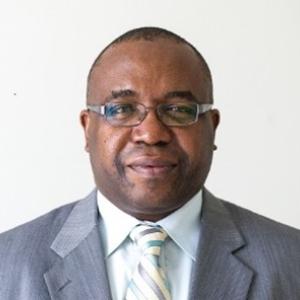
Obijiofor Aginam
MGIEP
Director
Dr Obijiofor Aginam has held senior positions at the United Nations University (UNU) serving as Senior Programme Officer & Chief of International Cooperation and Development at the UN University-Institute for Sustainability and Peace at UNU headquarters in Tokyo (2007-2013), and Deputy-Director and Head of Governance for Global Health at the UN University-International Institute for Global Health (UNU-IIGH) in Kuala Lumpur, Malaysia (2013-2019). He is currently a Principal Visiting Fellow at UNU-IIGH, and Adjunct Research Professor of Law and Legal Studies at Carleton University, Ottawa, Canada. Prior to UNU, Dr. Aginam was a tenured Professor of Law and Legal Studies at Carleton University where he taught international law, law of international organizations, United Nations system, global governance, and human rights. He was a Global Health Leadership Officer at the World Health Organization headquarters in Geneva where he worked on the revision of the International Health Regulations (IHR) in the then WHO Communicable Diseases Cluster. He has been a fellow of the Social Science Research Council (SSRC) of New York on “Global Security and Cooperation”.
Dr. Aginam served as a consultant of the UN Food and Agriculture Organization (FAO) on “governance of Anti-microbial Resistance”, and trade and food safety involving field missions to Bangladesh and Laos. He was a member of the United Nations Inter-Agency Taskforce on Non-communicable Diseases (2013-2019), and a visiting professor at the University for Peace, Costa Rica, and universities in Italy, South Africa, and Japan. He was a member of WHO Expert Committee to review the International Health Regulations (2022-2023) appointed by the Director-General of WHO, and currently serving as a member of the Expert Advisory Group on the WHO Traditional Medicine Summit. He serves on the editorial boards of Global Health Governance: The Scholarly Journal for the New Health Security Paradigm; Global Biosecurity and other journals. Dr Aginam holds a PhD from University of British Columbia. He is the author/editor of Global Health Governance: International Law and Public Health in a Divided World; Humanizing Our Global Order, and other publications on global governance, international law, human rights, diplomacy, UN system, and sustainable development.
Dr. Aginam served as a consultant of the UN Food and Agriculture Organization (FAO) on “governance of Anti-microbial Resistance”, and trade and food safety involving field missions to Bangladesh and Laos. He was a member of the United Nations Inter-Agency Taskforce on Non-communicable Diseases (2013-2019), and a visiting professor at the University for Peace, Costa Rica, and universities in Italy, South Africa, and Japan. He was a member of WHO Expert Committee to review the International Health Regulations (2022-2023) appointed by the Director-General of WHO, and currently serving as a member of the Expert Advisory Group on the WHO Traditional Medicine Summit. He serves on the editorial boards of Global Health Governance: The Scholarly Journal for the New Health Security Paradigm; Global Biosecurity and other journals. Dr Aginam holds a PhD from University of British Columbia. He is the author/editor of Global Health Governance: International Law and Public Health in a Divided World; Humanizing Our Global Order, and other publications on global governance, international law, human rights, diplomacy, UN system, and sustainable development.
Read more

Paul Procee
World Bank
Acting Country Director
Paul joined the World Bank in 1999 and has since worked on a wide range of projects focused on urban infrastructure and sustainable development sectors. In the early years, he was the task team leader of various urban, infrastructure, environment, and disaster risk management projects. In 2010, he moved to China to continue working as a project manager in these sectors and gradually took over the coordinating role of the infrastructure and sustainable development teams in the country. Between 2015 and 2019, he supervised the sustainable development and infrastructure portfolios in Brazil, collaborating with IFC and counterparts to enhance the market for private sector investments and infrastructure services. In 2019, Paul became the Operations Manager for the Argentina, Paraguay, and Uruguay Country Management Unit, overseeing the entire IBRD portfolio and supporting strategic engagement with these countries. In August 2024, Paul moved to India to serve as the Operations Manager in the India Country Office, where he is responsible for managing the largest IBRD portfolio globally and supporting strategic engagement with the Government of India.
Read more

Pranita Upadhyaya
ITU
Area Representative for South Asia
Professor Dr. Pranita Upadhyaya is a well-known professional in the IT industry, holding a Ph.D. in Computer Engineering with over 27 years of experience. She served as the CEO of Meddsoft Nepal, Professor, and Vice Principal at Kathford College of Engineering and Management, while also managing Telemedicine and AI projects at B.P. Eye Foundation. Her past roles include serving as the Executive Director, Principal, Chief Technical Officer, and IT Consultant. Dr. Upadhyaya's expertise spans administration, academia, and technology, contributing significantly across government, semi-government, and private sectors in Nepal. She has contributed to shaping cutting-edge information technology solutions, enhancing system performance, and optimizing software development productivity. Her impactful influence extends to academia, where her mentorship has positively impacted students and institutions. Renowned for her work in artificial intelligence and cybersecurity, she has spearheaded successful projects, including telemedicine and AI predictive models. Beyond her professional commitments, Dr. Upadhyaya is actively engaged in social work, particularly focused on improving the lives of patients through the use of technology. Her recent achievement includes designing an AI-incorporated healthcare prediction model, reflecting her commitment to pioneering solutions at the intersection of technology and healthcare. As these projects progress into implementation, Dr. Upadhyaya remains dedicated to her career objective, leaving a lasting impact on the field.
Read more
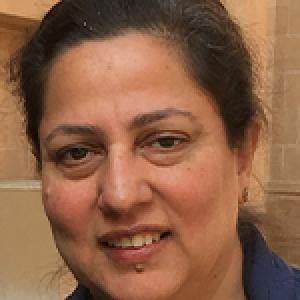
Preeti Soni
APCTT
Head
Dr Preeti Soni’s leadership and experience spans over a wide range of fields including policy analysis, strategic planning in the areas of environment, climate change, energy, technology and sustainable development and programme implementation.
Dr Soni served as the Chief, Climate Change, Resilience and Energy Programme at UNDP in India from 2018 to June 2021. She worked with UNDP India from 2004 and held multiple positions of Assistant Country Director and Head (Energy and Environment), Advisor (Climate Change), and the Resource Person for the UN Solution Exchange Environment Community. She was instrumental in developing several strategic programmes and partnerships and overseeing their implementation at UNDP. Prior to UNDP India, she worked with The Energy and Resources Institute (TERI) in New Delhi.
She holds a PhD in Environmental Economics and Climate Policy from the Institute of Environmental Studies, Vrije University, The Netherlands and a Masters in Economics from Delhi School of Economics, Delhi University, India.
Dr Soni served as the Chief, Climate Change, Resilience and Energy Programme at UNDP in India from 2018 to June 2021. She worked with UNDP India from 2004 and held multiple positions of Assistant Country Director and Head (Energy and Environment), Advisor (Climate Change), and the Resource Person for the UN Solution Exchange Environment Community. She was instrumental in developing several strategic programmes and partnerships and overseeing their implementation at UNDP. Prior to UNDP India, she worked with The Energy and Resources Institute (TERI) in New Delhi.
She holds a PhD in Environmental Economics and Climate Policy from the Institute of Environmental Studies, Vrije University, The Netherlands and a Masters in Economics from Delhi School of Economics, Delhi University, India.
Read more
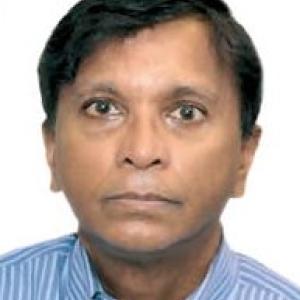
Mr. Ranil Salgado, a dual national of the U.S. and Sri Lanka, became the IMF Resident Representative based in Delhi in March 2024. He has been in the IMF for over 27 years and is an Assistant Director in the IMF’s Asia and Pacific Department (APD).
Prior to his appointment on India and Bhutan, he was most recently the IMF’s mission chief to Japan and supervised work on Timor-Leste and Tonga. He co-edited the book “South Asia’s Path to Resilient Growth” that was published in 2023. Among his previous
roles in APD, he served as the mission chief to India (2017-2020), the Marshall Islands, Myanmar, and Nepal, as well as chief of the Regional Studies Division and the IMF Resident Representative in Singapore (2005-2008). He also supervised work on
Bhutan, the Maldives, and Micronesia. His time at the IMF includes work in the Western Hemisphere; Research; and Strategy, Policy, and Review Departments.
Prior to joining the IMF, he worked in a strategy management consulting firm and as teaching and research assistants at the University of Pennsylvania, Johns Hopkins University, and the Federal Reserve Board of Governors. He attended the University of Pennsylvania (masters & PhD in economics), along with Harvard University (undergraduate in chemistry) and Cambridge University (masters in biochemistry).
Prior to his appointment on India and Bhutan, he was most recently the IMF’s mission chief to Japan and supervised work on Timor-Leste and Tonga. He co-edited the book “South Asia’s Path to Resilient Growth” that was published in 2023. Among his previous
roles in APD, he served as the mission chief to India (2017-2020), the Marshall Islands, Myanmar, and Nepal, as well as chief of the Regional Studies Division and the IMF Resident Representative in Singapore (2005-2008). He also supervised work on
Bhutan, the Maldives, and Micronesia. His time at the IMF includes work in the Western Hemisphere; Research; and Strategy, Policy, and Review Departments.
Prior to joining the IMF, he worked in a strategy management consulting firm and as teaching and research assistants at the University of Pennsylvania, Johns Hopkins University, and the Federal Reserve Board of Governors. He attended the University of Pennsylvania (masters & PhD in economics), along with Harvard University (undergraduate in chemistry) and Cambridge University (masters in biochemistry).
Read more

Roi Chiti
UN-Habitat
Officer-in-Charge
Roi Chiti is an Italian national, holding a degree in Architecture and Urban Planning, an MA in “Development and International Aid”, and an MSc in “Land Use and Water Management”, in addition to other specializations in the field of human settlements planning and management.
Since the late 1990’s he has been coordinating and implementing urban development and renewal projects in Italy as well as Mediterranean and Latin American countries within the European Union’s city networks as an advisor to local governments. At the Italian Ministry for Foreign Affairs – Department of Development Cooperation (2006-2009) he led integrated development programs on urban infrastructure and basic services in South Sudan and the coastal province of Kenya.
Joined UN-Habitat in 2009 as Kenya Chief Technical Advisor at the Regional Office for Africa, and in 2012, he moved to the External Relations Division, where he coordinated the substantive programme of three editions of the World Urban Forum (WUF), the premier global platform on sustainable urban development.
Between 2014 and 2017, Roi was seconded to the Habitat III Secretariat to lead the UN drafting team of the New Urban Agenda and coordinate all the relevant knowledge and policy dimensions feeding into its final formulation. He led the World Urban Campaign of UN-Habitat from 2018-2019, before moving to Santiago de Chile as Coordinator of Regional and UN Interagency frameworks in Latin America and the Caribbean, within the UNECLAC premises. From 2021to 2025, he headed the UN-Habitat Multi-country Office for Colombia, Ecuador, Bolivia, Peru, and Venezuela.
Since June 2025, he has been the Regional Coordinator and Representative for India, Sri Lanka and the Maldives.
Since the late 1990’s he has been coordinating and implementing urban development and renewal projects in Italy as well as Mediterranean and Latin American countries within the European Union’s city networks as an advisor to local governments. At the Italian Ministry for Foreign Affairs – Department of Development Cooperation (2006-2009) he led integrated development programs on urban infrastructure and basic services in South Sudan and the coastal province of Kenya.
Joined UN-Habitat in 2009 as Kenya Chief Technical Advisor at the Regional Office for Africa, and in 2012, he moved to the External Relations Division, where he coordinated the substantive programme of three editions of the World Urban Forum (WUF), the premier global platform on sustainable urban development.
Between 2014 and 2017, Roi was seconded to the Habitat III Secretariat to lead the UN drafting team of the New Urban Agenda and coordinate all the relevant knowledge and policy dimensions feeding into its final formulation. He led the World Urban Campaign of UN-Habitat from 2018-2019, before moving to Santiago de Chile as Coordinator of Regional and UN Interagency frameworks in Latin America and the Caribbean, within the UNECLAC premises. From 2021to 2025, he headed the UN-Habitat Multi-country Office for Colombia, Ecuador, Bolivia, Peru, and Venezuela.
Since June 2025, he has been the Regional Coordinator and Representative for India, Sri Lanka and the Maldives.
Read more
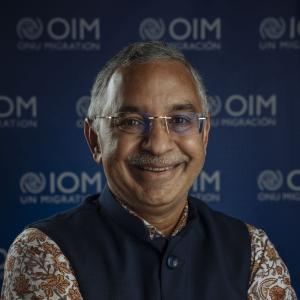
Sanjay Awasthi, IOM’s Head of Office for India, brings nearly three decades of experience in diverse development and humanitarian contexts. His work has spanned Asia and Africa, addressing issues such as agriculture, food security and livelihoods, health, nutrition, HIV, and peacebuilding. His career has been dedicated to capacity building of communities and community-based organisations. He excels in networking with different communities, donors, and the government.
Guided by the Global Compact for Migration (GCM), Sanjay leads the IOM’s initiatives in India to facilitate the safe, orderly, and regular migration of skilled Indian professionals and students in partnership with the Ministry of External Affairs and other government and non-government partners. Sanjay has previously been the Country Director of VSO, a UK-based international organisation in Ghana that recognises and realises the potential of volunteers, the Country Director for Oxfam in South Sudan and Malawi and as a humanitarian programme professional in Ethiopia and Sudan, focusing on WASH, livelihoods, camp management and drought impact assessment & response initiatives. While working for CARE International, he also led the Tsunami Response Programme in Southern India.
Mr Awasthi has a master’s degree in Sociology and an M Phil Degree in Social Medicine & Community Health from the Jawaharlal Nehru University (JNU), New Delhi.
Guided by the Global Compact for Migration (GCM), Sanjay leads the IOM’s initiatives in India to facilitate the safe, orderly, and regular migration of skilled Indian professionals and students in partnership with the Ministry of External Affairs and other government and non-government partners. Sanjay has previously been the Country Director of VSO, a UK-based international organisation in Ghana that recognises and realises the potential of volunteers, the Country Director for Oxfam in South Sudan and Malawi and as a humanitarian programme professional in Ethiopia and Sudan, focusing on WASH, livelihoods, camp management and drought impact assessment & response initiatives. While working for CARE International, he also led the Tsunami Response Programme in Southern India.
Mr Awasthi has a master’s degree in Sociology and an M Phil Degree in Social Medicine & Community Health from the Jawaharlal Nehru University (JNU), New Delhi.
Read more
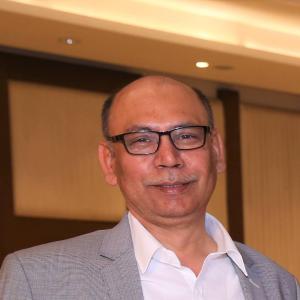
Sushil brings over two decades of experience of working with the United Nations and with the Consultative Group on International Agricultural Research system in the areas of policy, programmes, partnerships and operations across natural resource management, governance, inclusion, and humanitarian assistance. His professional expertise includes disaster risk reduction, rural development, and social inclusion.
Prior to joining United Nations Volunteers Programme, Sushil coordinated the UNDP India’s engagement for empowerment of indigenous communities by connecting them with their legal land rights and welfare entitlements, strengthening delivery of basic services and promoting innovation in hard-to-reach areas inhabited by some of the most vulnerable people. In Myanmar, Sushil supported the preparation of the Post-Nargis Recovery and Preparedness Plan for the country and was closely engaged with the implementation of the world’s largest disaster risk management program of Government of India-UNDP India (2002-07).
Sushil is passionate about unlocking the potential of digital technologies and innovation in building inclusive and economically resilient communities. Some of his close to heart initiatives (1000 Springs, Adivasi Grants Management Systems -ADIGRAMS and Forest Rights Act MIS) are currently under national roll-out.
Prior to joining United Nations Volunteers Programme, Sushil coordinated the UNDP India’s engagement for empowerment of indigenous communities by connecting them with their legal land rights and welfare entitlements, strengthening delivery of basic services and promoting innovation in hard-to-reach areas inhabited by some of the most vulnerable people. In Myanmar, Sushil supported the preparation of the Post-Nargis Recovery and Preparedness Plan for the country and was closely engaged with the implementation of the world’s largest disaster risk management program of Government of India-UNDP India (2002-07).
Sushil is passionate about unlocking the potential of digital technologies and innovation in building inclusive and economically resilient communities. Some of his close to heart initiatives (1000 Springs, Adivasi Grants Management Systems -ADIGRAMS and Forest Rights Act MIS) are currently under national roll-out.
Read more
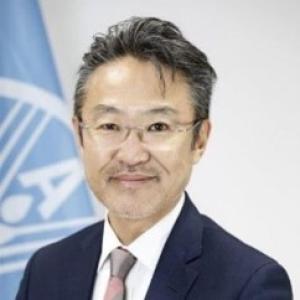
Mr Takayuki Hagiwara is appointed as the FAO Representative in India effective 29 May 2023.
Mr Hagiwara, a national of Japan, holds a Master of Science in Forestry from Yale University with a focus on Participatory Resources Management in the United States.
Following the completion of his master degree in 1993, Mr Hagiwara began his career as a development consultant in the private sector in Japan. From 1996 and 2000, he served as a Natural Forest Management and Agroforestry Expert at a forest conservation project supported by the Japan International Cooperation Agency (JICA) in Panama. Upon concluding his assignment in Panama, he continued working as a development consultant until he joined FAO in 2003.
Mr Hagiwara commenced his career at FAO as a Natural Resources Management Officer, in the Asia and the Pacific Service at the Investment Centre (CFI). He progressively took on greater responsibilities, serving as a Senior Natural Resources Management Officer from 2012 to 2015, and later as the Chief of the Asia and the Pacific Service from 2015 to 2020. Throughout his tenure at the CFI, he provided technical assistance to projects supported by the World Bank, IFAD, JICA and EU.
During his career, Mr Hagiwara contributed to the preparation and implementation of various projects including those focused on community-based natural resources management and livelihood development, and helped JICA’s adoption of the Farmer Field School platform in Kenya and Ethiopia. He also conducted numerous training sessions and authored a farmer field school implementation guide based on his practical experiences in the field.
One of his notable achievement was his role as the lead technical officer on the Sustainable Livelihood Development Project in Kenya’s Mau Forest Complex, which received FAO’s Edouard Saouma Award in 2013. In this capacity, he piloted a mobile phone-based monitoring system, established a partnership with a local bank and Kenya Forest Service Revolving Fund and facilitated community-based enterprise development with RuralInvest.
Mr Hagiwara has served as the Regional Programme Leader at the FAO Regional Office for Asia and the Pacific in Bangkok, Thailand from January 2021. In this role, he has supported the regional office to implement FAO’s strategic framework and overseen the development and implementation of the programmes in the region, providing guidance to technical officers at the regional office and facilitate coordination with the FAO representatives in the region.
Mr Hagiwara, a national of Japan, holds a Master of Science in Forestry from Yale University with a focus on Participatory Resources Management in the United States.
Following the completion of his master degree in 1993, Mr Hagiwara began his career as a development consultant in the private sector in Japan. From 1996 and 2000, he served as a Natural Forest Management and Agroforestry Expert at a forest conservation project supported by the Japan International Cooperation Agency (JICA) in Panama. Upon concluding his assignment in Panama, he continued working as a development consultant until he joined FAO in 2003.
Mr Hagiwara commenced his career at FAO as a Natural Resources Management Officer, in the Asia and the Pacific Service at the Investment Centre (CFI). He progressively took on greater responsibilities, serving as a Senior Natural Resources Management Officer from 2012 to 2015, and later as the Chief of the Asia and the Pacific Service from 2015 to 2020. Throughout his tenure at the CFI, he provided technical assistance to projects supported by the World Bank, IFAD, JICA and EU.
During his career, Mr Hagiwara contributed to the preparation and implementation of various projects including those focused on community-based natural resources management and livelihood development, and helped JICA’s adoption of the Farmer Field School platform in Kenya and Ethiopia. He also conducted numerous training sessions and authored a farmer field school implementation guide based on his practical experiences in the field.
One of his notable achievement was his role as the lead technical officer on the Sustainable Livelihood Development Project in Kenya’s Mau Forest Complex, which received FAO’s Edouard Saouma Award in 2013. In this capacity, he piloted a mobile phone-based monitoring system, established a partnership with a local bank and Kenya Forest Service Revolving Fund and facilitated community-based enterprise development with RuralInvest.
Mr Hagiwara has served as the Regional Programme Leader at the FAO Regional Office for Asia and the Pacific in Bangkok, Thailand from January 2021. In this role, he has supported the regional office to implement FAO’s strategic framework and overseen the development and implementation of the programmes in the region, providing guidance to technical officers at the regional office and facilitate coordination with the FAO representatives in the region.
Read more
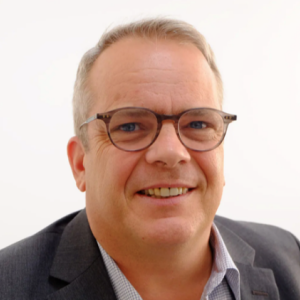
Timothy Curtis
UNESCO
Director of the UNESCO Regional Office in New Delhi and UNESCO Representative to India, Bhutan, Maldives and Sri Lanka
On 2 October 2023, Tim Curtis (Australia) assumed the position of Director and UNESCO Representative for the UNESCO Regional Office in New Delhi covering Bangladesh, Bhutan, India, Nepal, the Maldives and Sri Lanka.
Prior to this appointment he served since January 2016 as the Secretary of UNESCO’s 2003 Convention for the Safeguarding of the Intangible Cultural Heritage, overseeing both the statutory and operational dimensions of UNESCO’s global programme for Living Heritage.
He has been working in the field of culture and sustainable development in diverse international contexts for over twenty-five years, of which twenty have been with UNESCO. He served as a UNESCO programme specialist for Culture in East Africa as well as in South East Asia from 2004 until 2016,
Prior to his work with UNESCO he was involved in advocacy and academic work, and received a PhD in Cultural Anthropology from the Research School of Pacific and Asian Studies at the Australian National University, for which he did extensive ethnographic research among the Na’hai speakers of Malakula, Republic of Vanuatu
Prior to this appointment he served since January 2016 as the Secretary of UNESCO’s 2003 Convention for the Safeguarding of the Intangible Cultural Heritage, overseeing both the statutory and operational dimensions of UNESCO’s global programme for Living Heritage.
He has been working in the field of culture and sustainable development in diverse international contexts for over twenty-five years, of which twenty have been with UNESCO. He served as a UNESCO programme specialist for Culture in East Africa as well as in South East Asia from 2004 until 2016,
Prior to his work with UNESCO he was involved in advocacy and academic work, and received a PhD in Cultural Anthropology from the Research School of Pacific and Asian Studies at the Australian National University, for which he did extensive ethnographic research among the Na’hai speakers of Malakula, Republic of Vanuatu
Read more
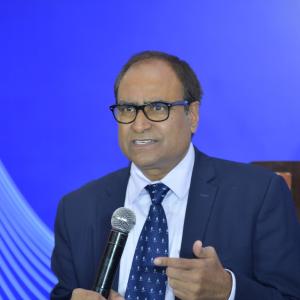
Mr. Vinod Mishra carries an experience of more than 30 years with 20 years of exclusive experience in the water and sanitation sector. His specific experience has been in terms of project management, training and capacity building, providing planning and implementation support to WASH (water sanitation & hygiene) programs across the districts, states and national levels in India. He has worked as Team leader of UNOPS for the implementation of the WSSCC (Water Supply and Sanitation Collaborative Council) project in India. He has developed the implementation strategy of WSSCC to support the Swachh Bharat Mission in India from 2014 to 2019. His recent work has largely been in the field of policy advocacy initiatives to promote collective behaviour change with equity, inclusion, capacity building, rapid action learning, studies, and research works. Currently working as Country Manager, UNOPS in India and implementing projects on water supply (Jal Jeevan Mission), sanitation, circular economy and health. He has a postgraduate in Political Science in International Relations and an MBA in Human Resource.
Read more

